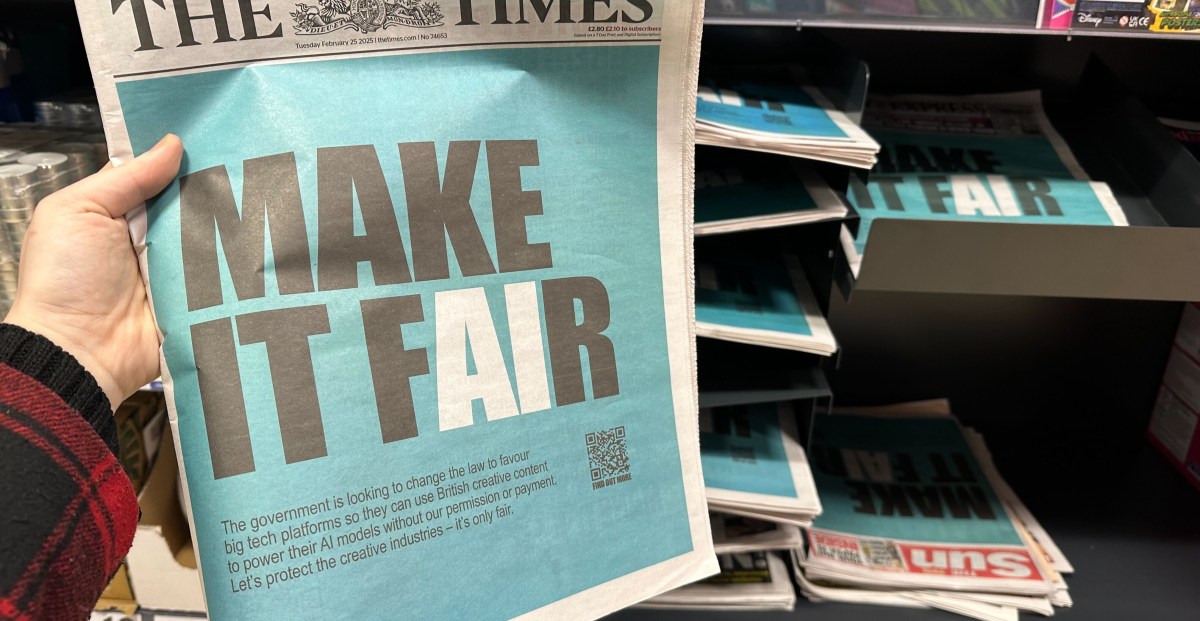UK Newspapers Unite in Bold Protest Against Erosion of AI Protections
In a remarkable demonstration of unity and purpose, UK newspapers have made headlines by blanking their front pages as a protest against the diminishing protections surrounding artificial intelligence (AI). This unprecedented action not only captures the essence of a growing concern among media outlets but also signals a clarion call for robust regulations in a rapidly evolving technological landscape. The implications of this movement are profound, touching on issues of ethics, public safety, and the future of journalism itself.
The Significance of the Protest
The decision to leave front pages devoid of content serves as a powerful visual metaphor for what many believe could be a future devoid of meaningful regulation for AI. By presenting blank pages, the newspapers are suggesting a future where information could be manipulated or misrepresented through unchecked AI technologies. This collective action has garnered attention not only in the UK but around the globe, initiating conversations about the ethical boundaries of AI development and deployment.
As AI technologies continue to permeate various sectors—from journalism to healthcare—there is an urgent need for comprehensive regulations that safeguard public interests. The concern is that without these protections, AI could exacerbate existing inequalities, spread misinformation, and even pose threats to privacy and security.
A Call for Clear Regulations
The protest highlights the pressing need for clear and enforceable regulations governing AI technologies. As AI systems become more autonomous, the potential for misuse grows exponentially. For instance, deepfake technology, which utilizes AI to create hyper-realistic fake videos and audio, poses significant threats to personal reputations and political landscapes. The absence of regulatory oversight can lead to a situation where misinformation becomes rampant, undermining the fabric of democratic societies.
- Transparency: There is a strong demand for transparency in AI operations, especially in understanding how algorithms make decisions.
- Accountability: Establishing accountability frameworks ensures that developers and companies are held responsible for the consequences of their AI systems.
- Ethics: Ethical considerations should be at the forefront, guiding the development of AI technologies to serve the public good.
The Role of Journalism in AI Regulation
Journalism plays a critical role in shaping public discourse around technology and its implications. By blanking their front pages, UK newspapers are not only protesting but also drawing attention to their responsibility in informing the public about AI’s risks and benefits. The media’s role in holding corporations and governments accountable is more crucial than ever.
Furthermore, journalists often find themselves on the front lines of AI’s impact. From automated content generation to algorithms that influence news distribution, the industry faces challenges that require a nuanced understanding of technology. As such, the call for AI protections is also a call for a more informed media landscape that can navigate these complexities.
Global Perspectives on AI Protections
The UK protest is part of a broader global movement advocating for AI regulations. Countries around the world are grappling with similar challenges. The European Union, for example, has been at the forefront of proposing regulations that aim to create a framework for AI development that prioritizes safety and ethical standards.
In contrast, other regions, particularly in the United States, have taken a more laissez-faire approach, prioritizing innovation over regulation. This divergence in regulatory approaches raises questions about the global landscape of AI and the potential for a regulatory race to the bottom, where countries with fewer restrictions may attract more technological investment at the cost of public safety.
What Comes Next?
The blank front pages by UK newspapers represent a significant moment in the ongoing discourse about AI and its implications. As the protest gains traction, it is essential for policymakers, technologists, and the public to engage in meaningful conversations about how to govern AI effectively.
Some possible next steps include:
- Public Engagement: Increasing public awareness and understanding of AI technologies and their implications is vital for informed decision-making.
- Collaborative Frameworks: Developing collaborative frameworks involving governments, tech companies, and civil society can help create balanced regulations that foster innovation while protecting public interests.
- International Cooperation: Given the global nature of technology, international cooperation on AI regulations will be crucial in establishing standards that transcend national borders.
Conclusion: A Future of Responsible AI Development
The bold protest by UK newspapers against the erosion of AI protections is a timely reminder that as technology advances, so too must our commitment to ethical standards and regulations. This movement serves not only to protect the integrity of journalism but also to ensure that AI development aligns with the broader interests of society.
As we move forward, it is imperative that all stakeholders—including tech developers, policymakers, journalists, and the public—collaborate to create a future where AI serves the common good, enhances democracy, and respects the rights of individuals. In doing so, we can harness the power of AI responsibly, ensuring it remains a tool for progress rather than a threat to our values and freedoms.
See more Future Tech Daily

